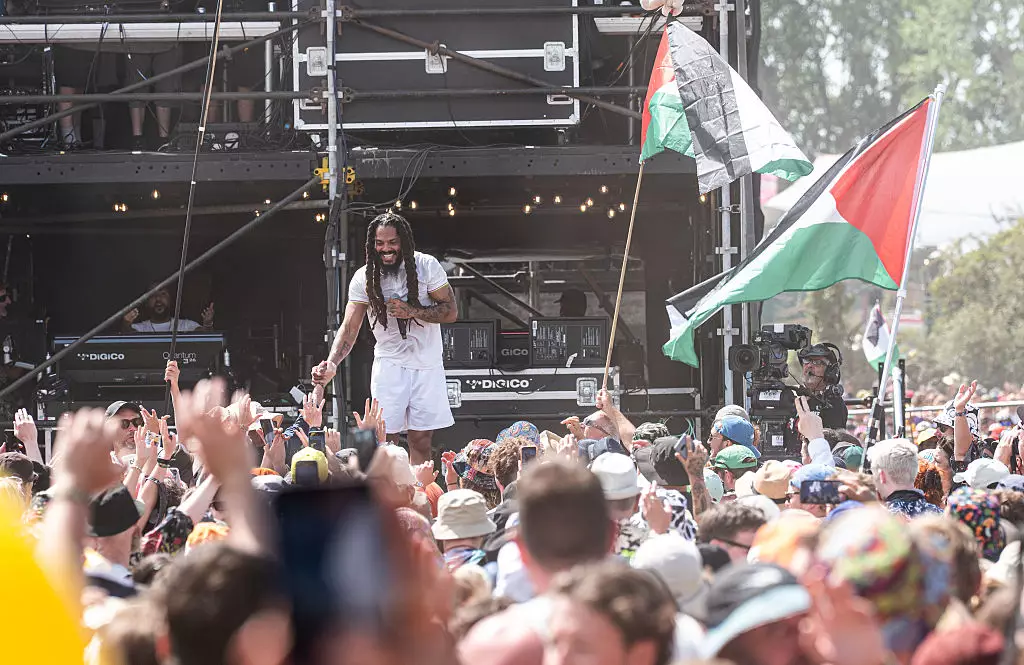Glastonbury Festival is renowned for its eclectic line-up and celebratory atmosphere, but its 2023 edition bore witness to a staggering conflation of music and political activism. British punk duo Bob Vylan’s performance ignited heated discussions and polarized public opinion. With an electrifying stage presence, the band propelled thousands into chants of “Death, Death To The IDF” and “Free, Free Palestine.” This was no ordinary concert; it was a clear manifestation of the band’s stance on one of the world’s most contentious geopolitical issues of our time.
Instead of merely inducing euphoria typically expected at such festivals, the duo invoked deep-seated emotions surrounding the Israeli-Palestinian conflict, a move that undoubtedly challenges the apolitical façade many artists adopt at festivals. The crowd, vibrant with Palestinian flags, mirrored the angst and passion the band expressed, merging art with the critical realities of contemporary life. In doing so, these performers not only entertained but engaged their audience in a form of dialogue—that is, if you can call confrontation a dialogue.
Defining Political Boundaries in Art
In a response that ricocheted across social media, a BBC spokesperson labeled Bob Vylan’s remarks as “deeply offensive” and hinted at the network’s decision to refrain from making the performance available on demand, showcasing the tension between artistic expression and a broadcaster’s responsibility. The nuanced nature of their live set complicates the relationship between performer and audience, raising questions about the limitations of expression in art. Should art remain unfettered by societal norms, particularly when addressing sensitive subjects? Or should it conform to conventional expectations for the sake of maintaining a semblance of objectivity?
The dichotomy continued when Kneecap, a controversial Irish band, subsequently led their own set of vocal outbursts against UK Prime Minister Keir Starmer, with chants reflecting broader anti-establishment sentiments. Kneecap’s frontman is currently facing serious legal challenges, yet the band’s audacity provides a haunting reminder that music can often be a vessel for defiance. Each of these performances reflects a deeply entrenched cultural narrative that promotes dissent against perceived injustices, and these artists are merely amplifying a voice that often goes unheard.
The Broader Telecommunications Landscape
The BBC’s disavowal of Bob Vylan’s set underscores the complicated interplay between media conglomerates and the art they cover. The network’s decision to censor represents a profound anxiety about the implications of giving voice to such sentiments in a highly charged sociopolitical climate. It’s worth pondering if this reticence reflects a broader trend in media today—balancing the act of informing the public while also not inflaming divided opinions.
Furthermore, the local police’s preliminary inquiry into statements made during these sets reveals a looming threat against artists who choose to confront the establishments that govern them in their music. In a world where the consequences of words can lead to backlash, both socially and legally, how can artists navigate this terrain of expression responsibly?
Art as Catalyst for Change
In many ways, the juxtaposition of these performances against the backdrop of the ongoing humanitarian crisis in Gaza adds an unsettling urgency to the question: can music still be a viable form of protest? The chilling statistics detailing thousands of casualties and the ongoing plight of Palestinian civilians elevate the stakes of public protest. Art, particularly music, has historically served as a clarion call for change, urging society to reflect and act.
By incorporating such seismic themes into their performances, Bob Vylan and Kneecap dissolve the boundaries of entertainment. They transform the stage into a battleground for ideas and identities. This integration of activism into artistic expression not only sparks heated discussions but also challenges passive audiences to engage with the complexities of the world beyond the festival grounds. Music’s role as a political tool is not just relegated to past movements; it possesses the potential to mold contemporary discourse and inspire future generations to continue the fight for justice, making it essential that artists wield their power with awareness and intent.
The dichotomy of appreciation and condemnation for what Bob Vylan and Kneecap have done at Glastonbury shows the landscape of modern music is as politicized as it’s ever been. With the growing prominence of social media, the repercussions for artists are more immediate and far-reaching than ever before.

